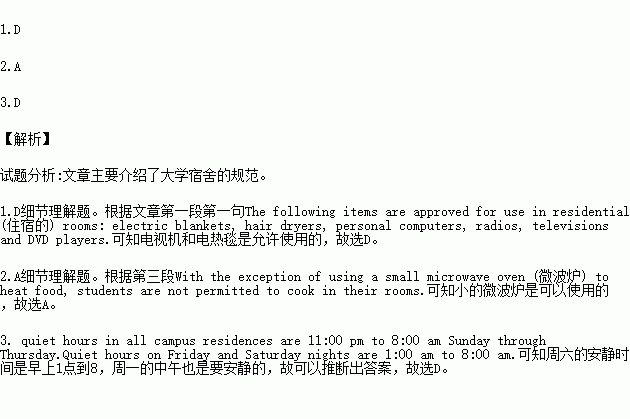题目内容
University Room Regulations
Approved and Prohibited Items
The following items are approved for use in residential (住宿的) rooms: electric blankets, hair dryers, personal computers, radios, televisions and DVD players. Items that are not allowed in student rooms include: candles, ceiling fans, fireworks, waterbeds, sun lamps and wireless routers. Please note that any prohibited items will be taken away by the Office of Residence Life.
Access to Residential Rooms
Students are provided with a combination (组合密码) for their room door locks upon check-in. Do not share your room door lock combination with anyone. The Office of Residence Life may change the door lock combination at any time at the expense of the resident if it is found that the student has shared the combination with others. The fee is $25 to change a room combination.
Cooking Policy
Students living in buildings that have kitchens are only permitted to cook in the kitchen. Students must clean up after cooking. This is not the responsibility of housekeeping staff. Kitchens that are not kept clean may be closed for use. With the exception of using a small microwave oven (微波炉) to heat food, students are not permitted to cook in their rooms.
Pet Policy
No pets except fish are permitted in student rooms. Students who are found with pets, whether visiting or owned by the student, are subject to an initial fine of $100 and a continuing fine of $50 a day per pet. Students receive written notice when the fine goes into effect. If, one week from the date of written notice, the pet is not removed, the student is referred to the Student Court.
Quiet Hours
Residential buildings must maintain an atmosphere that supports the academic mission of the University. Minimum quiet hours in all campus residences are 11:00 pm to 8:00 am Sunday through Thursday. Quiet hours on Friday and Saturday nights are 1:00 am to 8:00 am. Students who violate quiet hours are subject to a fine of $25.
1.Which of the following items are allowed in student rooms?
A. Ceiling fans and waterbeds.
B. Wireless routers and radios.
C. Hair dryers and candles.
D. TVs and electric blankets.
2.What do we know about the cooking policy?
A. A microwave oven can be used.
B. Cooking in student rooms is permitted.
C. A housekeeper is to clean up the kitchen.
D. Students are to close kitchen doors after cooking.
3.When can students enjoy a party in residences?
A. 7:00 am, Sunday. B. 7:30 am, Thursday.
C. 11:30 pm, Monday. D. 00:30 am, Saturday.

